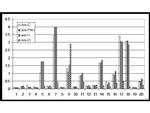Search Thermo Fisher Scientific
FIGURE: 1 / 1
NAG-1 Antibody (600-406-B08) in ELISA

Product Details
600-406-B08
Species Reactivity
Host/Isotype
Class
Type
Immunogen
Conjugate
Form
Concentration
Purification
Storage buffer
Contains
Storage conditions
Shipping conditions
Product Specific Information
Store vial at 4° C prior to restoration. For extended storage aliquot contents and freeze at -20° C or below. Avoid cycles of freezing and thawing. Centrifuge product if not completely clear after standing at room temperature. This product is stable for several weeks at 4° C as an undiluted liquid. Dilute only prior to immediate use.
This antibody specifically reacts with a H variant sequence of human NAG-1 protein from human tissues. A BLAST analysis was used to suggest partial reactivity with NAG-1 from chimpanzee and macaque based on a 92% homology. Cross-reactivity with NAG-1 from other sources has not been determined.
Target Information
GDF-15 belongs to the TGF-beta cytokine family, whose members play an important role during prenatal development and postnatal growth, and the remodeling and maintenance of a variety of tissues and organs. GDF-15 is expressed predominantly in the placenta and, to a much lesser extent, in various other tissues. The presence of GDF-15 in amniotic fluid and its elevated levels in the sera of pregnant women suggest GDF-15's involvement in gestation and embryonic development. GDF-15 generally exerts tumor suppressive activities and is one of the predominant factors produced and secreted in response to activation of the p53 pathway. Interestingly, the serum level of GDF-15 is positively correlated with neoplastic progression of several tumor types, including certain colorectal, pancreatic, and prostate cancers.
For Research Use Only. Not for use in diagnostic procedures. Not for resale without express authorization.
References (0)
Bioinformatics
Protein Aliases: GDF-15; Growth/differentiation factor 15; Macrophage inhibitory cytokine 1; MIC-1; NAG-1; NAG1; NRG-1; NSAID (nonsteroidal anti-inflammatory drug)-activated protein 1; NSAID-activated gene 1 protein; NSAID-regulated gene 1 protein; Placental bone morphogenetic protein; Placental TGF-beta; Prostate differentiation factor; PTGF-beta
Gene Aliases: GDF-15; GDF15; MIC-1; MIC1; NAG-1; PDF; PLAB; PTGFB
UniProt ID: (Human) Q99988
Entrez Gene ID: (Human) 9518

Performance Guarantee
If an Invitrogen™ antibody doesn't perform as described on our website or datasheet,we'll replace the product at no cost to you, or provide you with a credit for a future purchase.*
Learn more
We're here to help
Get expert recommendations for common problems or connect directly with an on staff expert for technical assistance related to applications, equipment and general product use.
Contact tech support
